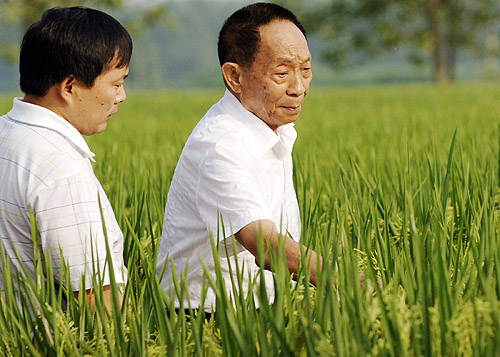|
 |
|
BIG YIELDS: Despite the remarkable accomplishments he has already achieved, Yuan Longping is still working hard to improve the hybrid rice strain he has developed (LI JIAN) |
From famine to feast, China's agricultural miracle could not be achieved without the efforts of Yuan Longping, a renowned and respected agricultural scientist who has been dubbed the "Father of Hybrid Rice." With more than half of China's paddy fields growing his high-yield hybrid strain, Yuan's scientific breakthrough has fed millions of people in the world's most populous country.
It all started with a dream he had as a child.
"I saw rice plants as tall as sorghum and each grain as huge as a peanut in the dream. I could even hide in the cool shadow of the rice crops," said Yuan, who was born into a poor Beijing farming family in 1930.
If the dream foretold anything, it was that his destiny was in agriculture. After graduating from Chongqing-based Southwest Agriculture College in 1953, Yuan, then 23, began a teaching career at an agriculture school in Anjiang, Hunan Province. In the 1960s, severe food shortages and natural disasters plunged the country into an unprecedented famine. Since then Yuan has devoted himself to researching and developing a better breed of rice.
But Yuan's road to a breakthrough was a bumpy one. He made no progress until July 1964, when he accidentally found a natural hybrid rice crop that was obviously stronger than the others he had investigated. The find provided a rare sample for him to delve into the genetic basis of rice heterosis, when the progeny of two different parents grow faster and yield more. In those years, Yuan was so dedicated to hybrid rice research that even thoughts of food and sleep seemed to have vanished from his mind.
After years of endeavors, Yuan and his team succeeded in artificially cultivating a commercially viable variety of hybrid rice in 1974. Yuan's discovery, which resulted in yields 20 percent higher than ordinary varieties, turned a new page in the history of China's agricultural development.
Over the past three decades, the advanced strain has been planted all over the country, boosting rice output nationwide from 5.69 billion tons in 1950 to around 20 billion tons in 2008. This has put the populous country in a better position to staunch its prolonged food shortage. As a result, the United Nations announced in 2006 that it had officially stopped sending grain assistance to China, marking a milestone on the country's path toward food self-reliance.
Zhai Huqu, President of the Chinese Academy of Agricultural Sciences, said hybrid rice was one of the biggest agricultural success stories that helped power the Chinese economic takeoff.
Yuan has shared his knowledge and techniques with foreign scientists and helped promote planting hybrid rice in more than 30 countries and regions around the world, such as India, Viet Nam and the Philippines. Hybrid rice is now being planted on around 1.5 million hectares across the globe and has proven to be an effective cushion against wrenching global food shortages.
The late U.S. economist Don Paarlberg said that Yuan's achievement is a victory against the threat of famine and that his work is ushering humanity into a world with ample food. Philippine President Gloria Macapagal Arroyo praised Yuan for "spurring the rapid development of hybrid rice in the Philippines and other Asian countries."
Yuan's contributions have won him numerous awards and honors, including China's State Supreme Science and Technology Award and the FAO (United Nations Food and Agriculture Organization) Medal of Honor for Food Security.
Yuan, who currently serves as director of the China National Hybrid Rice Research and Development Center, has not relaxed his efforts to further improve the strain so as to raise the yield of rice.
"China still faces the risk of grain shortfalls as the acreage of farmland dwindles and the number of farmers drops," he said. "The hybrid variety also has much room to further advance in terms of yield and quality."
After reaching the targets of 700 kg and 800 kg per mu (0.066 hectare) in 2000 and 2004, respectively, Yuan began working on a variety he is calling "super rice," an improved version of the hybrid that he believes will yield 900 kg per mu by 2010.
"By 2020, when I will be 90 years old, I hope to get 1,500 kg of rice per mu," he said. | 
